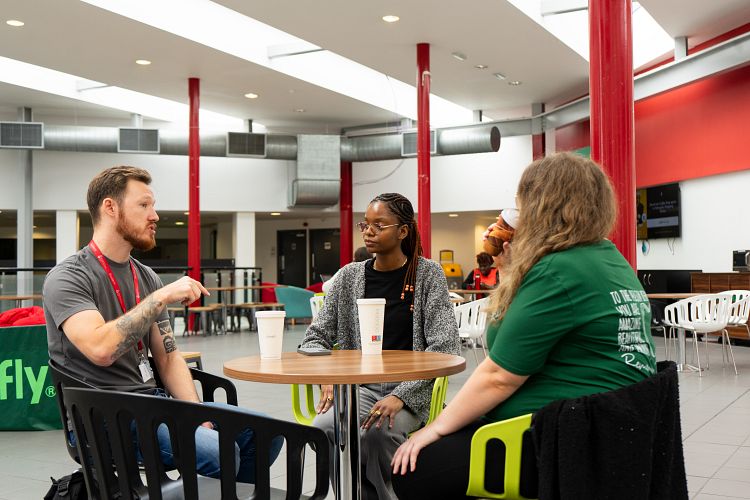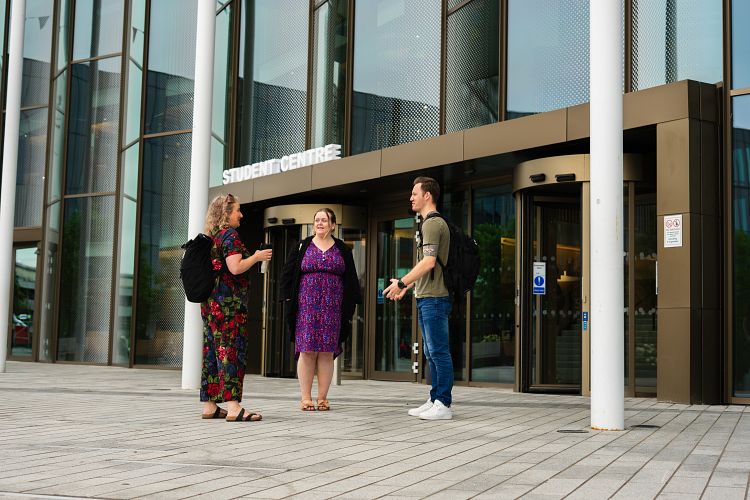New Era
Things have changed. Get to know your new Union.
At the heart of your Students’ Union is a clear mission: helping you Learn Well and Live More during your time at university. We want every student to feel supported, connected and able to succeed, not just in lectures and exams but in every part of student life.
Our vision is a future where students are thriving because we are too. A future where the Union is strong, active and responsive, always ready to meet your needs and stand alongside you. That’s why we’ve committed to tackling the cost of studying, protecting student wellbeing and making sure every student has the chance to achieve in their education.
But the old structures were holding us back. If we were serious about these ambitions, we couldn’t just carry on as before. Change had to happen.
Over time, the system we relied on stopped working. Course Reps were making impact in some courses and not in others, School Presidents felt distant and overloaded, and Elected Officers, felt overworked and out of touch with everyday student life. Students told us decision-making was slow and irrelevant. The evidence agreed: election turnout kept falling, representative roles left people burnt out and too many students felt excluded.
To understand the scale of the problem, we ran the biggest review in our history. Over six months we surveyed hundreds of students, held workshops, spoke to University staff, worked with Elected Officers and Student Council, listened to SU staff and tested ideas with our Board of Trustees. We even brought in an external consultant to challenge our thinking and keep us honest.
We quickly realised things had to change.
Our old system reflected the status quo in the sector and for many decades it served us well. But patching over the cracks was no longer enough. Instead of clinging to a model that had reached its limits, we chose to rebuild from the ground up. The result is a structure designed for today’s students and tomorrow’s challenges. We had a lot of feedback from students to say you wanted varied roles available at the SU both paid and unpaid, elected and not, to suit different students with different circumstances. So we have changed the opportunities that are available to students as part of our new structure.
The old ‘sabbatical officer’ roles of President, Vice President Welfare, Vice President Activities, and Vice President Education no longer exist. These were full-time posts typically held by recent graduates or students taking a year out from study.
They’ve been replaced by Students’ Union Representatives who study alongside you and understand what student life feels like right now. They:
- Are paid and trained to represent the voice of students, by taking insight to decision makers
- Have the most access to the power-holders at the University, for example via the Board of Governors
- Can also act as Community Leaders for the national student movement, the whole institution, or on a smaller level by academic, place or identity, as they are current students
- Are part of the Union Leadership Team with School Reps and the SU Senior Leadership Team (SLT) — shaping agendas for Student Assembly and highlighting live student issues that need attention
- Have a number of responsibilities and therefore need to ‘wear different hats’ when being a leader, Rep, Trustee or Governor for example.
We’ll be electing our SU Reps for 26/27 in Spring 2026. If this varied role sounds like something you’d like to step up to, keep your eyes out for nominations going live!
Get to know your Students' Union Representatives
We received a lot of feedback that Schools are where you feel most attached to whilst at University, so it’s crucial that we regularly speak to students representing these spaces. And we’ve gone a step further by bringing them into a steering body for the Students’ Union, along with the Students’ Union Reps to ensure that we have dedicated and regular student voice flowing into the organisation all year round.
The previous School President role has been replaced with School Representatives, made up of one student per school elected to represent the views of students in their respective schools to University staff. They:
- Are elected, unpaid students who represent the voice of students at a School level, by taking insight (generated by the SU) to decision-makers
- Are also Community Leaders for their School
- Hold a key representative role in the University’s Student Voice Framework
- Make up part of the Union Leadership Team with SU Reps and the SU Senior Leadership Team (SLT) — shaping agendas for Student Assembly and highlighting live student issues that need to be heard and actioned throughout the academic year
We’ll be electing our School Reps for 26/27 in Spring 2026. If this varied role sounds like something you’d like to step up to, keep your eyes out for nominations going live!
Get to know your School Representatives
Democratic leadership is a core principle of ours, so of course we still have elected roles (both paid and voluntary) for you to engage with at that level.
However, these roles alone were not able to create the change needed to truly improve students’ lives. Too much pressure on lone individuals, working tirelessly but without networks of students to go with them on the change-making journey. This led to the people in these roles burning out and becoming frustrated.
In response to this, we've brought in new paid roles for students to organise on the ground, with students. Working closely with elected representatives, they will understand where we need to focus our efforts, equipped with training and tools as part of a national organising network.
This new way of working is rooted in the principals of broad-based Community Organising and we've affiliated with Citizens UK to ensure this change is grounded in strong principals and expertise. This organisation has a proud history of bringing about lasting societal change, most notably the Living Wage.
To deliver impact, we're using the five steps to social change:
Communities are spaces where students come together around what matters to them, supported by paid Community Organisers who help turn ideas into action and action into change.
There are three types of Communities that we call 'clusters':
- Academic
- Identity and Inclusion
- Faith and Nationality
We still support Student Groups, they just fit into one of these clusters now. And we now have capacity to create spaces for students that need community but don't want to or can't set up and run a society.
Join a Community or Student Group
Community Leaders are students who want to take the initiative in shaping and supporting their communities. They:
- Are any student who wants to lead in their Community
- Could lead within a course, a society, a sports team, a faith group, a hobby or interest group, or a shared identity group
- Can also lead action groups for key issues
- Are unpaid volunteers giving skills and time to boost their community and develop new skills
Join a Community or Student Group
Community Organisers are students who work to build community power and strengthen collective student voice through direct action and collaboration. They:
- Are paid and trained to organise students to build strong, fun, and active communities
- Work flexibly with different communities as and when listening and organising is needed
- Are not decision makers for the organisation — they are facilitators of student-led action
- Will need to maintain clear boundaries between the Community Leader role whilst on the job, but they of course can be student community leaders as well
Join a Community or Student Group

Join a Community or Student Group
Universities are under more pressure than ever. Rising costs, fewer international students and growing student needs are forcing big changes across the sector. Students are feeling the impact in every part of their university experience.
Students’ Unions are working hard to make sure your voice isn’t lost in the noise. But the old ways of doing things haven’t kept up, at least not at the University of Lancashire.
It would have been easy to carry on as before, making small tweaks to old structures. But that wasn’t good enough. We chose instead to rebuild from the ground up, creating a model that’s inclusive, sustainable and powerful enough to put your voice at the centre of every decision.
We’re not claiming to have all the answers, or that this new approach will deliver groundbreaking change overnight. What we do know is that the old way of working was no longer enough and we have the courage to try something new.
This change will take time to embed, this first year is all about finding out what works and collecting feedback on what we need to tweak.

It’s easy to get involved and depending on what you want to change, we’ve made it simple to find the right route for you.
See how our processes work
Because the old system wasn’t working. Engagement was low, volunteer roles were unsustainable, and too many students felt excluded or burnt out. Crucially we weren't having the impact on the big-ticket items that you have been telling us they need us to be working on e.g. cost of studying and getting the education you deserve.
The roles of President, VP Welfare, VP Activities and VP Education no longer exist. They’ve been replaced by four part-time paid Students’ Union Representatives. These are current students who represent you while studying alongside you, so they’re directly connected to student life.
School Presidents no longer exist. Each academic School now has an elected School Representative whose job is to make sure your academic voice is heard, your feedback acted on and your learning experience continually improves.
We made the decision to not formally support elected Course Reps this year because we received a lot of feedback that how effective these voluntary roles were in bringing about change varied significantly from School and Course. Therefore, we’ve redirected resources to support student-led change by developing a student-led Research and Insight and Influence Team, which will monitor feedback from all our channels and highlight issues at course, school, and community levels.
In our new structure, any student can volunteer (without the need for elections) to be a leader for their course Community and share feedback via the Student Voice Platform or by contacting a member of the SU directly and we’ll work with you from there.
It’s a proven approach used around the world to achieve real change.
We are using the 5 Steps of Social Change, a proven approach used around the world to achieve real change. Scroll back up the page to see the diagram of this process!
We’re currently in the ‘Organising’ phase, by working with students to form stronger communities.
We’ve also started the ‘Listening’ phase with Community Organisers working on the ground listening to more students than ever before and sharing these stories with our new Insight and Influence team to build a clear picture of what students need to change.
By joining a Community, taking part in listening campaigns and attending the Student Assembly. These spaces set the agenda and decide what we fight for together.
You’ll have more accessible ways to get involved, stronger support to make change happen and more direct influence on your university experience. This is about making sure your voice doesn’t just get heard, but gets results.
Not at all. Standing for one of the 14 elected roles is one option, but there are many other ways to take part, like joining a Community, supporting a campaign or sharing your feedback.
That’s fine. You can get involved at whatever level suits you, from giving quick feedback to joining a campaign or taking on a leadership role. Every voice counts.